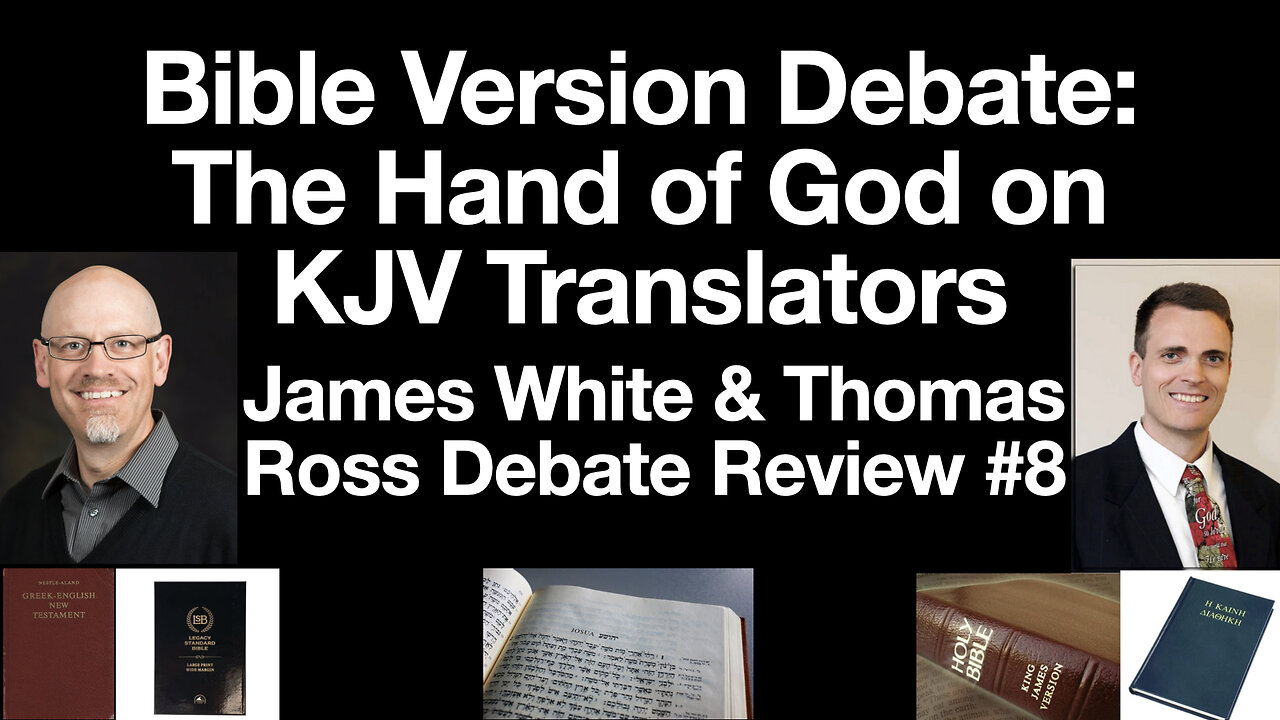Premium Only Content

James White & Thomas Ross Debate Review #8: The Hand of God on the KJV Translators & King James Only
"The Hand of God on the KJV Translators: Special Providence in the collation of the Textus Receptus and the King James Version of the Bible" is review video #8 examining the James White - Thomas Ross debate “The Legacy Standard Bible, as a representative of modern English translations based upon the UBS/NA text, is superior to the KJV, as a representative of TR-based Bible translations." The statements in the King James Bible's prefatory "Translators to the Reader" on the translators' claim that God's special providential guidance was involved in their translation, as well as their intention that the English-speaking world be King James Only, is examined, along with the fact that the KJV translators indicated that the Roman Catholicism of their day viewed Erasmus as an "enemy," while Protestants viewed Erasmus as a friend.
James White loves mentioning (as he did in the King James Only debate with Dr. Ross) that Erasmus was a Roman Catholic priest when he edited the first edition of the Textus Receptus in 1516, before the Reformation started. Dr. White very rarely points out that in 1516, as it was before the Reformation, 99% of people in Europe were Roman Catholics, so of course Erasmus was a Roman Catholic. Nor does James White often call Luther, Wycliffe, Huss, the Anabaptist Balthasar Hubmaier, Zwingli, or William Tyndale a Roman Catholic priest, although all were, nor does White often remind his readers that Calvin received the Roman Catholic tonsure; only Erasmus is regularly associated by White with the Catholic priesthood.
One should not be surprised that Roman Catholicism generally viewed Erasmus as an "enemy," while Protestants viewed him as a friend, since Erasmus wrote a book called Julius Excluded From Heaven (Iulius Exclusus), a best-seller about how the Pope was excluded from heaven; he declared that “the Popes now are the vickares of Iulius Caesar, of Alexander the great, of Croesus, and of Xerxes, not of Christ nor of Peter"; and all of Erasmus’ books were put on the index of forbidden reading by the Roman Catholic religion. Nearly all of the leaders of the Reformed communities had been disciples of Erasmus, who favored a moderate middle way of reform. Truly, “Erasmus laid the egg that Luther hatched.”
James White claimed that that the KJV preface taught that “they were in no way, shape, or form, saying that the translations that came before theirs were inferior … that’s just not what they believed.” White’s claim here is exactly the opposite of what the preface actually says. The KJV translators viewed their version as a superior and the “principal” translation, not to be “excepted against.” In line with the Hampton Court Conference, the very purpose for the translation of the Authorized Version was that there should be “one uniform translation” to which the “whole Church” was to be “bound, and none other.” That is, they created the KJV with the very purpose of making the English-speaking world of that day King James Only!
The KJV translators did NOT claim that they were translating under the kind of control of the Holy Spirit possessed by the Apostles and prophets. However, they DID claim that "the good hand of the Lord" was "upon" them, referring to this language in Ezra and Nehemiah for the special providence of God. Likewise, classical Baptist and Protestant confessional statements ascribe preservation neither merely to the general providence of God—they are stronger than that—nor to a series of continual miracles—that is more than they affirm—but to the special providence of God, so that the Word is by "his singular care and Providence kept pure in all Ages" (1689 London Baptist Confession). The KJV translators employed this same language of special providence in connection with their work of translation.
God’s working in providence is NOT imperfect and does NOT necessarily involve errors. God’s “singular care and providence” are well able to guarantee His people a “pure” Word “in all ages” without a perpetual miracle. In the book of Esther the name “Jehovah” and the word "God" do not appear, but Jehovah’s preservation of His people in accordance with His covenantal promises to Abraham and Moses is a key theme. God can providentially and perfectly control, time, and orchestrate events for the preservation of His Word without any specific miracle taking place. Providential preservation does not mean imperfect preservation.
Claiming that God’s special providence, His singular care, His “good hand,” was involved in the collation of the printed Textus Receptus is expected Biblically, is affirmed confessionally, and is rational historically. Expecting that God’s good hand, His singular care and providence, were involved in the translation of what God knew would be the standard English Bible for 400 years in what was going to become the world language is not contradicted by the translators, but is, on the contrary, exactly what they themselves claimed for their own translation.
-
 2:55:27
2:55:27
Mally_Mouse
9 hours agoSpicy HYDRATE Saturday! -- Let's Play!
44.9K4 -
 1:38:06
1:38:06
GameWithV
3 hours ago $0.47 earnedSaturday Play
15K1 -
 LIVE
LIVE
Spartan
5 hours agoHalo for a bit, Octopath after maybe
252 watching -
 2:58:09
2:58:09
SavageJayGatsby
5 hours agoSpicy Saturday with Mally! - Wedding in 2 Months!
35.2K1 -
 1:47:14
1:47:14
VapinGamers
7 hours ago $2.05 earnedTools of the Trade - Does Production Matter? with Tim the Tool Man from Louder with Crowder
26.3K2 -
 LIVE
LIVE
BSparksGaming
5 hours agoHappy Saturday! Battlefield 6 Beta! PS5 Gameplay
80 watching -
 15:53
15:53
Exploring With Nug
14 hours ago $3.92 earnedExploring Texas Creeks for Fossils – Prehistoric Treasures Everywhere!
32.9K4 -
 9:02
9:02
MattMorseTV
11 hours ago $15.50 earnedTrump's FBI just DECLASSIFIED the UNEDENIABLE PROOF.
40.5K91 -
 3:57:54
3:57:54
TinyPandaface
5 hours agoYour FACE is A Gaming Channel! | Mario Golf Super Rush w/ The Fellas!
6.37K2 -
 2:50:10
2:50:10
sophiesnazz
8 hours ago $4.12 earned6kd in these ghost lobbies !socials !specs
27.9K2